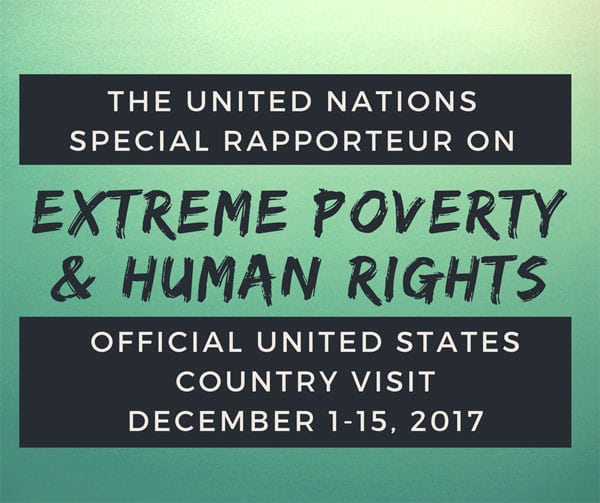
June 4, 2018, Fortune, Los Angeles Times
Philip Alston, United Nations Special Rapporteur on extreme poverty and human rights, will present his findings from his 12-day fact-finding tour on poverty in the US to the UN Human Rights Council in Geneva, Switzerland on June 21st. During his tour, Alston made stops in California, West Virginia, Alabama, and Puerto Rico. An early version of his findings was released in December and was covered in NPQ by both Jim Schaffer and Marty Levine, but his final report was only published a month ago.
While Alston’s report focuses on poverty, its findings, as Sarah Gray in Fortune points out, are far broader, covering not just income inequality and child poverty, but also voting rights, mass incarceration, health care, racism, and stereotypes surrounding poverty, just to name a few.
Some of the findings of the report include the following:
- “Successive administrations, including the current one, have determinedly rejected the idea that economic and social rights are full-fledged human rights.”
- “The cornerstone of American society is democracy, but it is being steadily undermined, and with it the human right to political participation protected in article 25 of the International Covenant on Civil and Political Rights.”
- “In the United States there is overt disenfranchisement of more than 6 million felons and ex-felons, which predominantly affects Black citizens since they are the ones whose conduct is often specifically targeted for criminalization.”
- “Covert disenfranchisement…includes the dramatic gerrymandering of electoral districts to privilege particular groups of voters, the imposition of artificial and unnecessary voter identification requirements, the blatant manipulation of polling station locations, the relocation of Departments of Motor Vehicles’ offices to make it more difficult for certain groups to obtain identification, and the general ramping up of obstacles to voting, especially for those without resources.”
- “Only about 64 per cent of the United States voting-age population was registered in 2016, compared with 91 per cent in Canada and the United Kingdom of Great Britain and Northern Ireland, 96 per cent in Sweden and nearly 99 per cent in Japan.”
- “Puerto Rico has a fiscal deficit and a political rights deficit, and the two are not easily disentangled.”
- “Some 49 million Americans live in federally designated ‘dental professional shortage areas’ and Medicare…does not cover routine dental care.”
- “The official point-in-time estimates of homelessness in 2017 show a nationwide figure of 553,742, including 76,501 in New York, 55,188 in Los Angeles and 6,858 in San Francisco.”
- “Some 11 million people are admitted to local jails annually, and on any given day more than 730,000 people are being held, of whom almost two-thirds are awaiting trial, and thus presumed to be innocent.”
- “Poor communities suffer especially from the effects of exposure to coal ash, which is the toxic remains of coal burned in power plants. It contains chemicals that cause cancer, developmental disorders and reproductive problems, and is reportedly dumped in about 1,400 sites around the United States—70 percent of which are situated in low-income communities.”
In an interview with Jenny Jarvie for the Los Angeles Times, Alston gave an overview of his travels:
Sign up for our free newsletters
Subscribe to NPQ's newsletters to have our top stories delivered directly to your inbox.
By signing up, you agree to our privacy policy and terms of use, and to receive messages from NPQ and our partners.
I started off in California, where the emphasis was on homelessness. I then flew over to Alabama, where the focus was on racial differences and the failure to provide even basic services, like sanitation, in areas that were very close to large cities…
I then went to Puerto Rico, which would definitely be the poorest state in the union if it were a state. The situation was very grim, even before Hurricane Maria, but obviously exacerbated greatly after it. I’m told I’m not supposed to use the term, but certainly, the conditions were very much Third World. I met people who were living without any real access to the basic services that we’ve come to expect. Government is just not an actor. There’s no provision of social protections at all…
I went to West Virginia, one of the states that did not take the Medicaid expansion, where they have relatively low rates of health insurance, and I saw the extent to which very few government services are provided for people generally—not just health, but access to the internet and so on.
In his report, Alston offers five policy recommendations. These are: 1) decriminalize being poor, 2) acknowledge the plight of the middle class, 3) acknowledge the damaging consequences of extreme inequality, 4) recognize a right to health care, and 5) get real about taxes (by which Alston means to encourage greater progressivity in the tax code).
Alston is under no illusion that his recommendations will be implemented quickly. “The United States is a proud nation. I don’t think that it will particularly appreciate being given such a poor report card before the international community. But I would very much like it if the US, when I present the report on June 21st to the Human Rights Council, would come out and try to defend its policies. I think that would be a very helpful step in getting serious debate going.”—Steve Dubb












